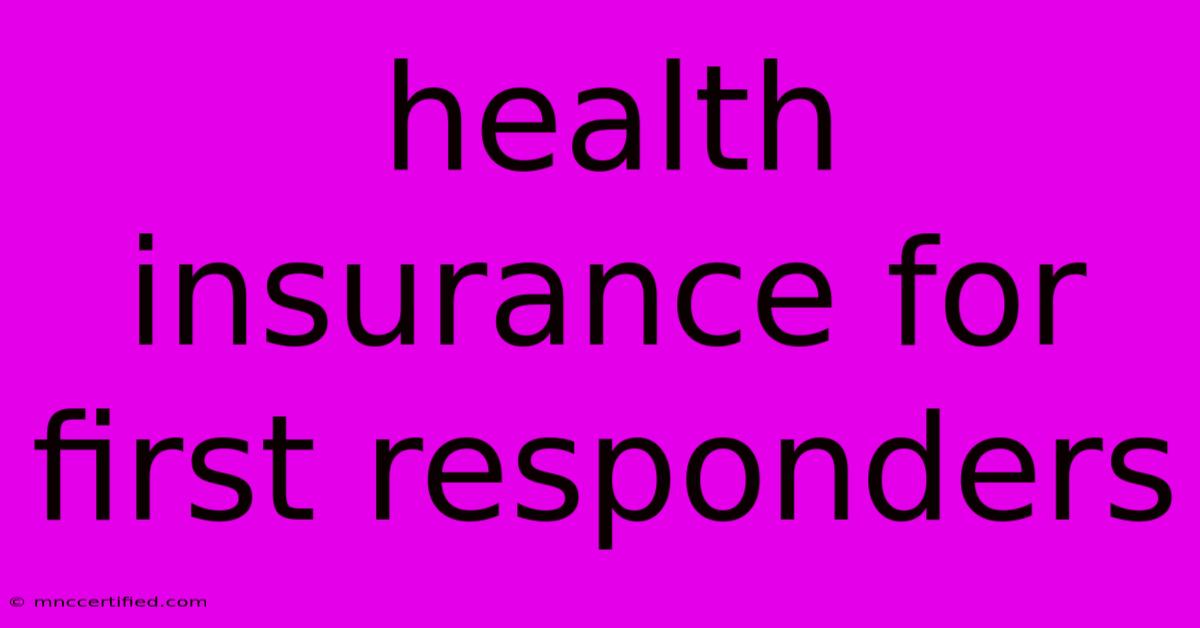Health Insurance For First Responders

Table of Contents
Protecting the Protectors: Health Insurance for First Responders
First responders are the unsung heroes who rush into danger, putting their lives on the line to protect others. Their dedication and bravery deserve unwavering support, including access to comprehensive and affordable health insurance. Unfortunately, the nature of their work often exposes them to unique health risks, making adequate insurance coverage a critical necessity.
Unique Challenges and Health Risks Faced by First Responders
First responders face numerous health challenges due to the demanding and potentially hazardous nature of their jobs:
- Exposure to Trauma: Dealing with traumatic events on a regular basis can lead to post-traumatic stress disorder (PTSD), anxiety, and depression.
- Physical Injuries: First responders are susceptible to muscle strains, sprains, and fractures due to the physical demands of their work.
- Exposure to Hazardous Substances: First responders may encounter toxic fumes, chemicals, and infectious diseases, increasing the risk of respiratory illnesses and long-term health complications.
- Shift Work and Irregular Sleep Patterns: Working unconventional hours can disrupt sleep cycles, impacting physical and mental well-being.
Why Specialized Health Insurance is Essential for First Responders
Standard health insurance plans may not adequately address the unique needs of first responders. Specialized plans offer crucial benefits and support, including:
- Mental Health Coverage: Provides access to therapy, counseling, and support groups to address the mental health challenges faced by first responders.
- Critical Illness Coverage: Offers financial assistance for diagnosis and treatment of serious illnesses like cancer, heart disease, and stroke.
- Disability Coverage: Protects income in case of injuries or illnesses that prevent them from working.
- Life Insurance: Provides financial security for their families in the event of untimely death.
Finding the Right Health Insurance for First Responders
Choosing the right health insurance plan involves careful consideration:
- Coverage Levels: Select a plan with adequate coverage for mental health, critical illness, disability, and life insurance.
- Premium Costs: Find a plan with affordable premiums that fit within your budget.
- Network Availability: Ensure the plan includes healthcare providers within your area.
- Employer Benefits: Explore group insurance plans offered by your employer, which often provide additional benefits and discounts.
- Government Programs: Investigate eligibility for government-funded health programs, such as Medicare and Medicaid.
Advocating for Better Health Insurance for First Responders
It's crucial to advocate for policies that improve health insurance coverage for first responders:
- Support legislation that expands access to affordable health insurance for all first responders.
- Raise awareness about the unique health challenges faced by first responders and the need for specialized coverage.
- Encourage employers to offer comprehensive health insurance plans to their first responder employees.
By providing comprehensive health insurance, we can ensure that first responders have access to the care they need to stay healthy and continue protecting our communities. Their dedication deserves our unwavering support and a commitment to their well-being.

Thank you for visiting our website wich cover about Health Insurance For First Responders. We hope the information provided has been useful to you. Feel free to contact us if you have any questions or need further assistance. See you next time and dont miss to bookmark.
Featured Posts
-
A Cats Guide To Bonding With Dragons
Nov 10, 2024
-
Eastleigh Remembrance Sunday And Armistice Day
Nov 10, 2024
-
Composite Bonding Cost With Insurance
Nov 10, 2024
-
Jemimah Admits Indias T20 Wc Struggles
Nov 10, 2024
-
Kkr Dc Players In Mumbais Probable Smat 2024 Squad
Nov 10, 2024